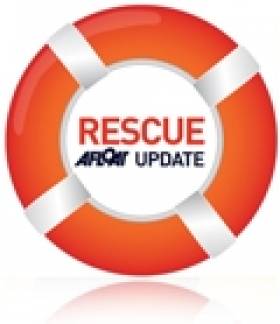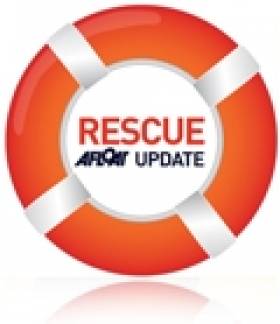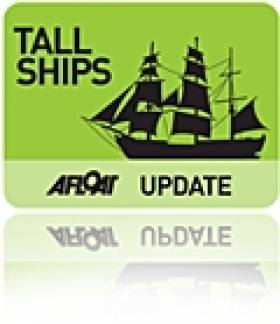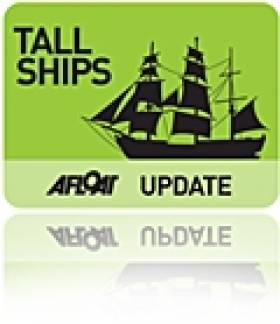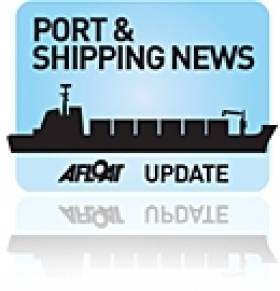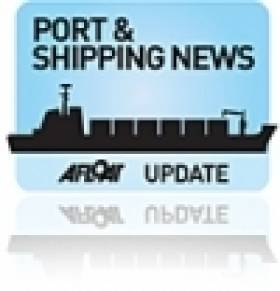Displaying items by tag: Aground
Body Recovered as Search for West Cork Fishermen Continues
#RESCUE - Garda divers have this morning recovered a body in their search for the crew of the fishing vessel Tit Bonhomme off the coast of West Cork.
As previously reported on Afloat.ie, five of the six-person crew went missing after the boat ran aground and went down rough seas near Adam's Rock, at the mouth of Glandore Harbour.
The five men include skipper Michael Hayes from Helvic Head in Co Waterford, Dubliner Kevin Kershaw (21) and Egyptians Said Mohammed (23), Wael Mohammed (35) and Attea Ahmed Shaban (26).
RTÉ News reports that the body recovered this morning has not been identified, but it is believed to be that of an Egyptian national.
Dive teams from the Garda and Naval Service have been set back by the trawler's position wedged in a narrow inlet with strong wash and backwash on either side, but were said to have made "significant progress" during dives yesterday.
A broader search is also being conducted inside and outside the harbour area and surrounding coastline, assisted by fishing boats, Irish Coast Guard rescue helicopters, and small boats and kayaks.
Search Resumes for Missing Fishermen in West Cork
#RESCUE - The search resumed this morning for five men missing after their fishing boat went down in rough seas in West Cork early yesterday, The Irish Times reports.
One of the six-person crew of the Tit Bonhomme was rescued when he was able to reach the shore, after the boat ran aground near Adam's Rock at the mouth of Glandore Harbour.
The missing include skipper Michael Hayes from Helvic Head in Co Waterford, Dubliner Kevin Kershaw (21) and Egyptians Said Mohammed (23), Wael Mohammed (35) and Attea Ahmed Shaban (26).
Abdul Mohammed (43) was airlifted by Irish Coast Guard helicopter to Cork University Hospital, where he is in a stable condition.
As previously reported on Afloat.ie, the fishing boat was returning to its home port of Union Hall early on Sunday in strong force 7-8 southeasterly winds when the incident occurred.
Naval Service and Garda divers were scheduled to search the sunken vessel today after postponing yesterday due to poor light and big swells.
The Irish Times has more on the story HERE.
Irish Couple Among the Rescued from Capsized Cruise Ship in Italy
#NEWS UPDATE - An Irish couple were among those rescued from the cruise ship that ran aground off the coast of Italy on Friday night, the Irish Examiner reports.
Three people are believed to have died, while 14 others were injured, after the Costa Concordia struck a sandbank and capsized off the Tuscan coastline in the Tyrrhenian Sea.
The vessel was carrying more than 4,000 passengers at the time, many of whom jumped into the water as panic set in after the ship hit a rock that tore a 150ft gash in the hull.
As of Saturday three bodies had been recovered from the sea, with at least three more feared drowned.
The Department of Foreign Affairs confirmed that an Irish couple on board are safe and well, and are receiving consular assistance. Many survivors are taking refuge on the small island of Giglio close to the incident.
The Irish Examiner has more on the story HERE.
Tall Ship Refloated Off Scotland
As previously reported on Afloat.ie, the 100-foot-long Irene of Bridgwater, with 10 people on board, became stuck in Lamlash Bay on its way to port at Greenock - one of five ports on the route of the 2011 Tall Ships Races.
A spokesperson for Clyde Coastguard told STV that the ship was refloated at 3.45am this morning.
"There were no injuries and no damage," she added.
Tall Ship Runs Aground off Scotland
The 100ft-long tall ship Irene of Bridgwater, with 10 people on board, became stuck in Lamlash Bay on its way to port at Greenock.
Clyde Coastguard said the ship was expected to refloat at high tide in the early hours of this morning. There was no danger to anyone on board.
Greenock is hosting the second stage of the race, following Waterford, Ireland. BBC News has more HERE.
Inspection of Refloated Ship in Galway Bay Under Way
Marine surveyors are currently inspecting the German cargo ship which was refloated yesterday in Galway Bay after running aground early on Thursday.
The Irish Coast Guard confirmed to The Irish Times that no pollution had occurred in the grounding of the Pantanal on the south Connemara coast.
The 120m vessel was refloated at high tide yesterday morning with help from the Celtic Isle tug from Foynes in Co Limerick.
Ship managers Harren & Partner said the hull would undergo a diver inspection before the vessel sails for dry dock.
Yesterday Minister for the Marine Simon Coveney welcomed the "successful operation in very challenging conditions" and confirmed a thorough investigation of the incident by the Marine Casualty Investigation Board.
The ship had been sailing from the Mediterranean to Rossaveal to collect two monohull ferries, sold to Mauritius, that had been built to serve the Aran Islands route.
The Irish Times has more on the story HERE.
Irish cargo-ship remains aground off Drogheda Port
The Drogheda Port Company's patrol launch, Boyne Protector has been monitoring the situation as the Arklow Raider lies close to the entrance of the Co. Louth port.


























